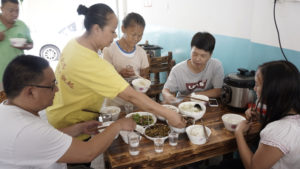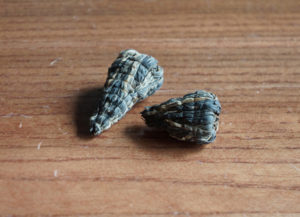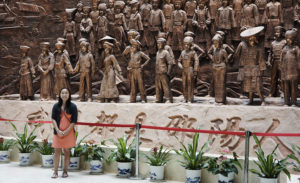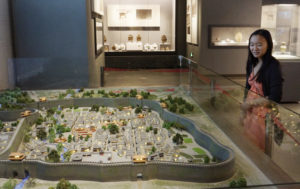
By Olivia Wolf
AsAmNews Intern
(Editor’s Note: This is the fourth in a series of blogs from Olivia Wolf on her journey to China in search of her birth parents)
It’s difficult to know who or what to trust when searching for Chinese birth families.
Sometimes it seems like everybody wants to help, but I am constantly being warned to be careful. People say we may have to sift through many liars, but that there’s always some truth to be found in a lie as well.
Since returning to the orphanage and the police station where I was supposedly found, we have met with reporters, visited a temple, and made several friends along the way.
Although our translator from Changsha was reluctant to go to the media, since the orphanage had previously asked her not to spread news of birth family searches, she let us know that the office for the daily newspaper was across from our hotel.
On Friday, my dad and I meandered into a huge and pristine, but seemingly empty building with a sign inside that read “Shaoyang daily newspaper.” We stood alone in the entrance for about ten minutes before we saw two people walk out of a room.
Showing them our flyer, I attempted to communicate my story and asked them if they could help. The man, Jay, called a few colleagues, and soon he was driving us to the central police station.
We conducted an interview with a reporter through a policewoman who was able to speak English. We also gave them all of our contact information. Throughout the whole ordeal, there were photographs being taken constantly.

Afterwards we headed to the restaurant of the reporter’s wife to have lunch. My dad was given copious amounts of baijiu (a Chinese alcohol) and beer. They said they don’t normally drink during the day, but they wanted to celebrate their meeting with us.
The next day we decided to relax and visit some tourist attractions. Unfortunately, on our way to Shuifu Temple, our taxi T-boned another car at an intersection with broken traffic lights. Luckily neither car was driving particularly fast, and everyone was OK.
We hailed another taxi and made it to the temple without further problems. As soon as we arrived, a man named Fred greeted us and brought us into the tea shop.

He walked us to the temple, which was sparse. Afterwards, he took us to a private room where he treated us to his own handmade tea. He told us that it’s not for sale in the shop. Once we were finished drinking, he gave us some tea leaves as a souvenir.
When we mentioned to Fred that we wanted to visit Baoqing Wall, he told us he’d accompany us. A crowd of people from the tea shop came along, though they eventually broke off to do their own thing.
At the top of the wall where the bell tower had been turned into a bar, Jeffrey informed us that he had to leave for a meeting. We said we’d stay in touch.
That night we met with Jay and his family for a delicious dinner. There were crayfish, meat skewers, dumplings, and vegetables. His kids were the entertainment of the night. They sang for us, and I must have played about a hundred rounds of rock-paper-scissors with the 6-year-old girl. It was a very pleasant evening.
On Sunday, we had a relatively low-key day. We bought clothing, toys, and diapers to donate to the orphanage.
We then met with Fred around noon at the hotel right next to ours, which is apparently for military use. He had read my story on the daily newspaper’s WeChat feed, and said he wanted to help. He asked if I could help with publicity for the hotel if the director agreed to “use the power of the hotel” to help with the search, and I told him that would be fine.

Fred and his brother then took us to the Shaoyang museum. At the end, they photographed me in front of a sign that said, “We are all Shaoyang people.”
Fitting, right?
During this time, I was also trying to figure out if a handwritten note on the back of one of my documents had any significance. I asked several Chinese people what they thought, and they all said the writing was messy and difficult to understand.
RELATED: Chinese American Adoptee Retraces the Steps of Her Adoption

My translator from Changsha told me that the note was the name of another child at the orphanage, 邵阳华 (Shaoyang Hua). However, the caretakers said that it was likely written randomly and has no importance.
Whether it does or not, if there’s a 邵阳华 out there who was residing at the Shaoyang Welfare Institute (邵阳社会福利院) around 1995, please reach out to me! It’ll be interesting to see if our stories do connect in any way.
*Some names have been changed
AsAmNews has Asian America in its heart. We’re an all-volunteer effort of dedicated staff and interns. You can show your support by liking our Facebook page at www.facebook.com/asamnews, following us on Twitter, sharing our stories, interning or joining our staff.


RE: Chinese American adoptee doesn’t know who to trust:When I went to China in 1978 I tried to stay to teach English. I was told yes so many times, even as my group was about to exit China. It was then that my cousin told me that in China, ‘yes’ can mean ‘no’ to save face. You might expect to have quite a few run arounds! When does ‘yes’ mean ‘yes’ and when does ‘yes’ mean ‘no’… Real action taken can be the indication. Good lunck!